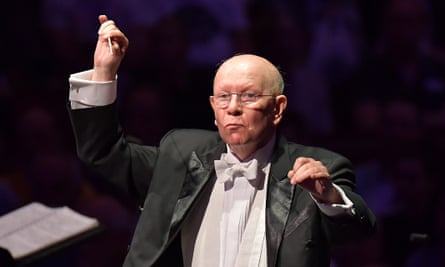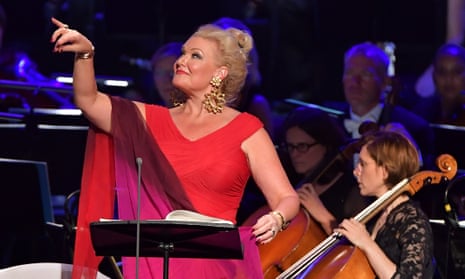Earlier this year, Karita Mattila and Jiří Bělohlávek gave a concert performance of Janáček’s Jenůfa at the Royal Festival Hall, London, which lingers in the mind as one of the great operatic achievements. This year’s Proms sees them back together for The Makropulos Affair – in a semi-staging by Kenneth Richardson, this time – and once again they prove to be well nigh ideal interpreters of the composer’s work.
Their approaches are comparable, combining the dramatic intensity with striking lyrical warmth in music that some have seen as primarily declamatory. Emilia Marty is a role that Mattila has very much made her own in recent years, and it’s hard to imagine it sung more beautifully or with greater opulence of tone – a tacit reminder, perhaps, that Marty is a diva by profession and that her manipulative charisma is as much the product of her singing as her glamour.
Yet Mattila’s characterisation also runs gloriously deep. A simple red dress decked out with constant changes of hair-do, jewellery and scarves suggested Marty’s ambiguous, chameleon-like nature. A sardonic laugh, and hints of bitterness etched in her lower registers indicated the terminal weariness and cynicism of one whose existence has been unnaturally prolonged by medical experimentation and who is now gradually coming to realise that life has meaning precisely because it is finite. The closing scene, in which Marty finally finds emotional release in acceptance of her own mortality, was realised in an engulfing flood of sound that took one’s breath away.
Conducting the BBC Symphony Orchestra, Bělohlávek similarly let the music sing without ignoring its neurotic, fidgety undertow. Despite a couple of slips in the internal balance in the off-stage brass, the prelude, with its broad melodies undercut with jagged figurations, set the tone for his entire interpretation. The shifting textures and relentless momentum were beautifully judged throughout.

It would be wrong, however, to suggest that the evening was essentially a two-hander, for there were fine performances elsewhere: a hypocritical, handsome-sounding, if fractionally young Prus from Svatopluk Sem; Aleš Briscein’s ardent Gregor; Gustáv Beláček, clipped and authoritarian, as the unimaginative lawyer Kolenaty; and Jan Ježek, deeply touching as Hauk-Sendorf, his scenes with Mattila desperately sad, rather than played for laughs as is sometimes the case.
Richardson’s direction of the protagonists, in a narrow strip of space in front of the orchestra, was sparse and clear, but one rather wished he had left it at that and not opted to add back projections on the screens that run behind the players and chorus (the BBC Singers). Some were clever (one of Mattila’s standard press shots for the signed photo Marty gives Kristina), others clumsy (a glass of whisky when Marty gets drunk). Most were distracting. The screens could have been better used for surtitles, which we desperately needed: many in the audience were struggling in a half-darkened auditorium to follow the text in the printed programme and rarely watching what was happening on the platform at all.

Comments (…)
Sign in or create your Guardian account to join the discussion